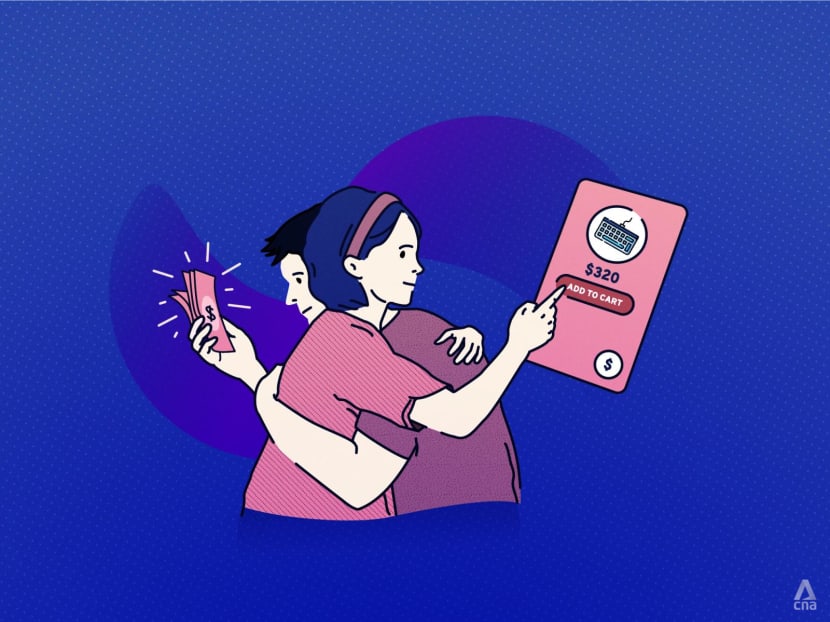Financial infidelity can erode trust as badly as emotional or physical betrayal, experts say
Financial transparency is one cornerstone of a healthy relationship, yet discussions around money can often be tricky to have. Here is how to approach the topic with your partner and navigate the conversation if it takes an uncomfortable turn.

Financial infidelity can hurt as much as physical or emotional betrayal, relationship experts said. (Illustration: CNA/Samuel Woo)

This audio is generated by an AI tool.
Adulthood is not just one phase of life but comes in stages. Its many facets can be overwhelming, from managing finances and buying a home to achieving work-life balance and maintaining healthy relationships. In this series, CNA TODAY's journalists help readers deal with the many challenges of being an adult and learn something themselves in the process.
After getting married, my husband and I made it second nature to talk about our personal shopping before splurging on anything.
It wasn’t always like this. We barely discussed our salaries while dating, merely dropping vague hints here and there.
However, we came to realise that open conversations about money matter because we’re in it for the long run.
If we disagree on a potential purchase, we would either hold off or find a compromise such as looking for alternatives to the item at a lower price elsewhere.
That being said, both of us have faltered and gone ahead in excitement to buy items without letting the other know first. For me, they would be cute stationery and keyboards. For him, Pokemon cards.
Thankfully, these delayed disclosures do not end up causing friction, since they are usually smaller purchases that we know will not lead to financial ruin.
For some couples, though, these undisclosed purchases or financial issues have had more serious consequences.
My colleague related a story about a friend who secretly bought a high-end bicycle worth a few thousand dollars and hid it at a stairwell of a public housing block for two years before his wife found out about it.
The couple were in a difficult financial place because he was between jobs.
The secret was finally exposed by a well-meaning neighbour who casually mentioned to the wife that they shouldn’t leave their bike there, in case someone stole it.
Confused, she told the neighbour that the bicycle wasn’t theirs. In response, the neighbour said that he had seen her husband using it, which left the wife furious.
It isn't just undisclosed purchases that can strain relationships.
Last year, a friend confided in me that she was having doubts about marrying her fiance after he revealed to her that he still had huge debts from a failed business, which he had accumulated before they started dating.
They eventually worked this out and got married.
From these two experiences I've heard, it seems that financial transparency in relationships can be a double-edged sword.
If you're upfront about your finances, your partner might react negatively and even reconsider the relationship.
If you keep it a secret, the fallout from being discovered later could be just as damaging.
Relationship counsellors said that discussions about finances – whether it’s about debt, how much you should save or have in savings or how much you earn – tend to stir up strong emotions, as well as create feelings of awkwardness and vulnerability.
So how much should you share with your partner and does timing matter?
LIKE CHECKING FUEL LEVEL OF A CAR
When they want financial transparency in a relationship, couples need to discuss everything under the sun, including income, debt, spending habits, financial goals and ongoing commitments.
This does not mean having to justify every purchase, the counsellors said, but it is about ensuring that there is a clear understanding of each other’s financial situation.
Consultant clinical psychologist Roy Chan, founder of the psychology clinic Cloaks and Mirrors, said that it is akin to checking the fuel level of a car before a trip.
“It’s not about comparison but about gauging the road ahead together, with both partners in the vehicle, which represents the relationship.”
Ms Angelin Truscott, a counselling psychologist in private practice at Annabelle Psychology, said that financial transparency has been associated with greater relationship satisfaction and commitment in relationships.
“Couples who discussed financial goals early on were found to be better able to plan for home purchases, children and retirement successfully.”
Ms Aarti Mundae, founder and lead psychotherapist at Incontact Counselling & Training, said that in her work, she has seen many couples become resentful towards each other due to their partner's lack of authenticity in their financial openness.
“This can cripple the relationship and cause significant feelings of betrayal, especially if the partner finds out that (the financial reality is drastically different) from what they had assumed,” she cautioned.
FINANCIAL TRANSPARENCY INCREASES AS RELATIONSHIP DEEPENS
Despite the need for transparency in a relationship, this does not mean diving straight into serious talks about finances after the first few dates or when a couple is still in the "honeymoon phase".
The experts noted that each stage of a relationship should begin with an appropriate level of financial disclosure and as the commitment deepens, so should the level of transparency.
Discussing specifics such as income or debt too early in the relationship may come across as impolite when people are still getting to know each other, Ms Truscott said.
She recommended that in the dating stage, couples start by discussing their general attitudes toward money: Are they savers or spenders? Generous or budget-conscious? How should dating expenses be split?
To better understand each other’s financial mindset and values, these questions may be asked:
- Do you consider yourself more of a saver or a spender? Why?
- What types of purchases do you feel are “worth it,” even if they are expensive?
- How do you decide when to treat yourself and when to hold back?
- How did your family handle money when you were growing up?
- Did your household discuss finances openly when you were a child?
- What’s one financial habit you picked up from your parents?
- How do you define financial success?
- Do you believe money can buy happiness or just stability?
As intimacy grows and the relationship becomes more serious, so does the sharing of financial information.
During the engagement phase, Ms Truscott said that couples should start aligning their finances with both their short- and long-term goals, whether it is buying a property, having children, career plans, travel dreams or retirement.
"Discuss and prioritise as a couple about what feels fair to both. One couple might decide to pay off a partner’s debts together, while another might agree that pre-marriage debts are one’s personal responsibilities."
She also emphasised the importance of setting a wedding budget together, considering what is affordable and reasonable for the event, as well as whether family members will be contributing.
"Practise handling large financial decisions as a team throughout the process," she said.
"For example, discuss how you’ll fund the wedding together and who will be responsible for payments to vendors, while learning to compromise and remain transparent about your needs and wants."
The counselling psychologist acknowledged that fully disclosing financial details can feel daunting, but as a couple moves toward marriage, these finances will have an impact on both their shared and individual futures.
"Think of it as a merger of two companies. Both of you need to know what the other is bringing in terms of assets and liabilities."
FINANCIAL CONVERSATIONS FOR MARRIED COUPLES
During marriage, deeper financial disclosures become crucial such as any plans for business ventures, desires to quit a job or a career shift, Dr Chan the clinical psychologist said.
Less commonly discussed, but equally important, are potential major financial outlays such as health issues – either personal or within the family – without adequate insurance coverage, he highlighted.
"Additionally, discussions around capital injections to expand or save a family business, or potential buyouts of a shareholder in the family business, should also be addressed."
Other key topics include how couples manage their bank accounts. They may keep separate accounts, merge everything into a joint account or opt for a hybrid approach, which is maintaining personal accounts while sharing one for household expenses.
No matter the option, Ms Truscott recommended creating a comprehensive budget that covers household expenses, personal discretionary spending, savings, investments and debt payments.
"Couples should agree on spending limits and check in regularly. Some might set a specific threshold for personal purchases, while others may allow for a no-questions-asked monthly personal spending allotment."
Ms Truscott also advised married couples to build an emergency fund to cover a few months of expenses, with a firm agreement to dip into it only for true emergencies.
When building a life together, she gave some examples of questions to ask about the following topics:
- How do you feel about combining finances fully, partially or not at all?
- Should large purchases such as those that are more than S$500 always be discussed beforehand?
- What budgeting system such as mobile applications or spreadsheets would you be open to using?
- How do you feel about borrowing money such as using credit cards or loans?
- Would you rather pay something off slowly or save up and pay in full?
- Are there any debts you feel hesitant to share or talk about?
- Should debt be paid off individually or as a team?
- How do we make sure both of us feel heard when making financial decisions?
HANDLING AWKWARD CONVERSATIONS ABOUT MONEY
Once a conversation about finances is initiated and in full swing, counsellors said that the next step is to navigate the conversation with empathy and respect, without criticism or blame.
What happens if your partner reveals that they have a lot of debt or that they earn significantly less than you?
On debt, Ms Aarti the pscyhotherapist said that understanding the root cause and its underlying issues is key.
"For example, if debt stems from commitments such as contributing beyond one’s means to family members, it is essential to discuss and set boundaries on how this will be managed moving forward."
She added that although they are difficult, conversations about financial struggles can provide valuable insights that aid financial planning and even strengthen intimacy between partners.
Dr Chan said that couples should allow space for emotions including shock or anger, especially if the debt was secretly accumulated beyond control such as through mounting interest from loans or credit card debt.
"The other partner can then decide if they are willing to help, since they are not obligated to," he added.
"This is because it is a relationship between two mature consenting adults who are capable of and have free will in making their own decisions, which includes financial decisions."
On the difference in earning power, the couple would have to decide what constitutes fairness in the relationship and which concept of fairness would be accepted by both partners, Dr Chan said.
"For some couples, fairness would look like the same percentage contribution from their salary to their joint account, since it represents an equal effort for both partners."
Beyond financial benchmarks, couples may also consider other forms of contribution to the relationship such as risk management, Dr Chan added.
“For example, one partner might earn more but work in a high-risk job with the potential for layoffs or restructuring.
“Meanwhile, the partner who is earning less but with greater job stability provides a safety net to ensure basic needs are met. This security allows the higher-earning partner to take career risks or step back if they’re burnt out or facing job loss.”
Other common financial transparency issues in relationships include secret spending, undisclosed bank accounts and stashing cash without the other partner’s knowledge.
The experts said that this behaviour, essentially known as financial infidelity, can erode trust, just like emotional or physical infidelity.
If financial infidelity occurs, couples may first acknowledge the betrayal and allow each other to express their feelings, Ms Truscott suggested. The partner who was dishonest should take full accountability without becoming defensive.
"Understanding the root cause is crucial. Explore the reasons behind the infidelity. Was it fear, guilt, addiction, poor communication or control issues?"
Once the root cause is addressed, the journey to rebuild trust with concrete action plans is just as important. Dr Chan advised couples to start by discussing their shared goals and envisioning their future together.
"Use those goals as the driving force behind financial decisions," he said.
"Create a clear plan for financial contributions and stick to it.
"A joint account can help ensure that basic needs like food, shelter and water are met and that contributions are made regularly before the end of each month."



















